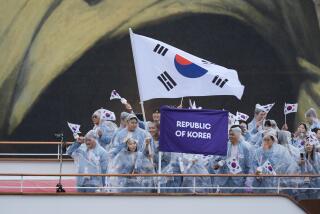BARCELONA ’92 OLYMPICS : Forgive and Forget, Mandela Urges : South Africa: He praises racial makeup of team as a good first step toward full representation.
- Share via
BARCELONA — So we watched the world go by last night. Colorful, vigorous, diverse, extravagant. And political to the core. All of which Barcelona’s Olympic opening ceremony reflected as well as ever in these hopelessly idealistic, warm and friendly rituals.
Impossible to miss among the universal spectacle was a tiny black man leading his delegation of virtually all-white South African athletes back into the Olympic family after 32 years of isolation.
Nelson Mandela, leader of the anti-apartheid movement that pushed for that international sports ban, was here to give his blessing.
“It’s important for our young people to participate,” Mandela said of the 95-person delegation, which includes only eight blacks. A month ago, with riots in the black townships again threatening to slow the process of integration, Mandela had suggested that South African athletes stay away from Barcelona.
But Saturday, during a brief morning pass through the Olympic village before the ceremony, Mandela said: “Let’s let bygones be bygones. Let’s concern ourselves with our presence here.”
So today, beginning at 9 a.m. with a 34-year-old dental technician, Trevor Strydom, in the modern pentathlon; and a 20-year-old student, Sean Bloch, in the men’s cycling time trial, South African athletes will be released from a kind of Olympic prison. Nothing so terrible as Mandela’s own 27-year incarceration, but frustrating to many, nevertheless.
The South Africans were treated with applause as their smiling, waving athletes and officials circled the stadium.
“There is no doubt in my mind this is the correct decision,” Mandela said, “and I am quite satisfied in the racial breakdown of the team. I would have liked it to be a reflection of our population”--26 million of the 32 million South Africans are black--”but there has to be a starting point.”
In South Africa, newspaper editorials have encouraged the Olympic participation as a spur to negotiations between Mandela’s black African National Congress and white South African President F.W. deKlerk, and as an emotional way to appeal to the most radical constituents on both sides.
Although typical South Africans, black and white, did not own television sets until the 1970s, and although black townships don’t have a high percentage of TVs because of lack of electricity, the team’s Olympic officials estimate those lucky enough to tune in saw Jan Tau, the black marathoner who was born in 1960--the same year South Africa last was allowed inside the Olympic door--serve as flag bearer on more than one symbolic level.
Today, after a handful of white athletes compete in swimming, they will see the first black athlete in South African history, 106-pound boxer Fana Thwala, compete in the Olympics. And they will be, according to 36-year-old equestrian Peter Gotz, thrilled.
“Olympic fever has just been raging in South Africa since last year,” Gotz said. “It’s been a very nice gesture to have Mr. Mandela here. He told us, as a team, that he was proud of us, and that the whole country is proud of us. I guess I don’t feel so much a part of history as I feel a part of the present and the future.”
It was by accident, said South Africa’s Olympic Committee vice president, Mluleki George, that the nation’s souvenir lapel pins were printed, some in black and some in white. But then, that isn’t unlike the real world. In the real world, Mandela, who acknowledging having done a little boxing and running a little track as a young man, had to leave Barcelona immediately after the opening ceremony.
Politics at home beckon.
More to Read
Go beyond the scoreboard
Get the latest on L.A.'s teams in the daily Sports Report newsletter.
You may occasionally receive promotional content from the Los Angeles Times.






